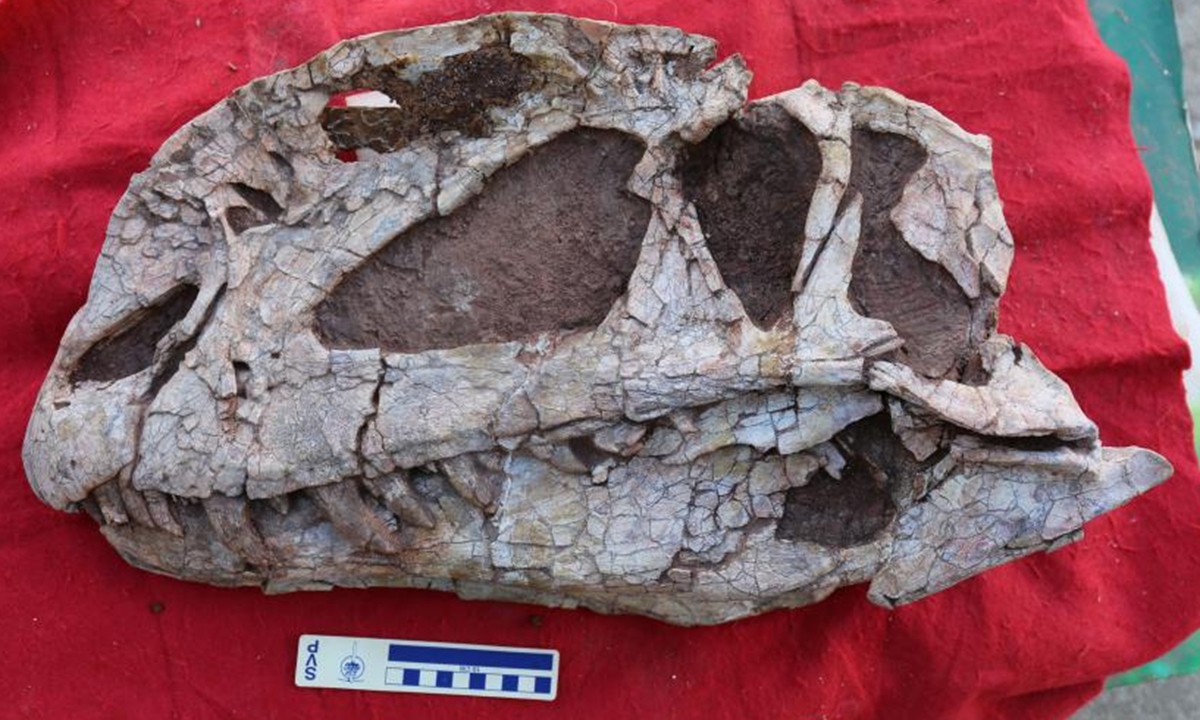Paleontologists discover unique features of Early Jurassic dinosaur

Photo: Courtesy of the Lufeng Dinosaur Fossil Protection and Research Center
A newly published article on a species of Sinosaurus, an extinct genus of theropod dinosaur that lived during the Early Jurassic Period, describes some unique features of the prehistoric beast that were previously unknown due to incomplete fossil specimens.

The article “A New Specimen of Sinosaurus triassicus (Dinosauria: Theropoda) from the Early Jurassic of Lufeng, Yunnan, China” published in the journal Historical Biology, an international journal on paleobiology, reports that a new specimen, recovered near the region where the holotype of Sinosaurus triassicus (S.triassicus) was found, has a complete skull with mandible and 11 cervical vertebrae that shed light on three unique features of the species.

The research was carried out by Zhang Zechuan and You Hailu from the Institute of Vertebrate Paleontology and Paleoanthropology of the Chinese Academy of Sciences (CAS) and Wang Tao from the Lufeng Dinosaur Fossil Protection and Research Center in Southwest China’s Yunnan Province.

A Chinese paleontologist told the Global Times on Thursday that the discovery helps fill in the blanks concerning some unique features that were missing from the first discovered fossil of S.triassicus.
Thomas Stidham, a US paleontologist who is currently working at the Institute of Vertebrate Paleontology and Paleoanthropology of the CAS, told the Global Times on Thursday that the new skull of S.triassicus (which is actually a species from the Jurassic, not the Triassic as originally thought) is well preserved and show that the species had two vertical crests on its head like dilophosaurus, which lived in what is now the US and was made famous in the first Jurassic Park movie.

“The new Yunnan fossils help to support the theory that this species of Sinosaurus is different from other similar extinct dinosaur species in China. It is one of the first dinosaurs named from China and after nearly 90 years since the first discovery of the first fragmentary fossils of this dinosaur, we can see what its whole skull looks like,” he said.
According to the Xinhua News Agency, S.triassicus was discovered in Lufeng in 1938. The holotype of S.triassicus was in poor condition and no previous research focused exclusively on it, so previously the fossil was considered to be a specimen of Dilophosaurus sinensis.

However, in 2015, researchers found a well-preserved skull and 11 associated neck fossils of S.triassicus in Lufeng, which revealed three unique features of the dinosaur, confirming that it was a new separate species.
The research also confirms that Dilophosaurus sinensis, previously thought to be a member of the North American genus, was also a member of the Sinosaurus family. The confirmation of these two similar dinosaur species has further enlarged the Chinese dinosaur family.

The discovery of these two new members of the Sinosaurus genus will have significant implications for the study of Sinosaurus evolution and the country’s prehistoric animal diversity. It will also shed light on the global distribution and evolution of theropod dinosaurs during the early Jurassic period, according to the article.